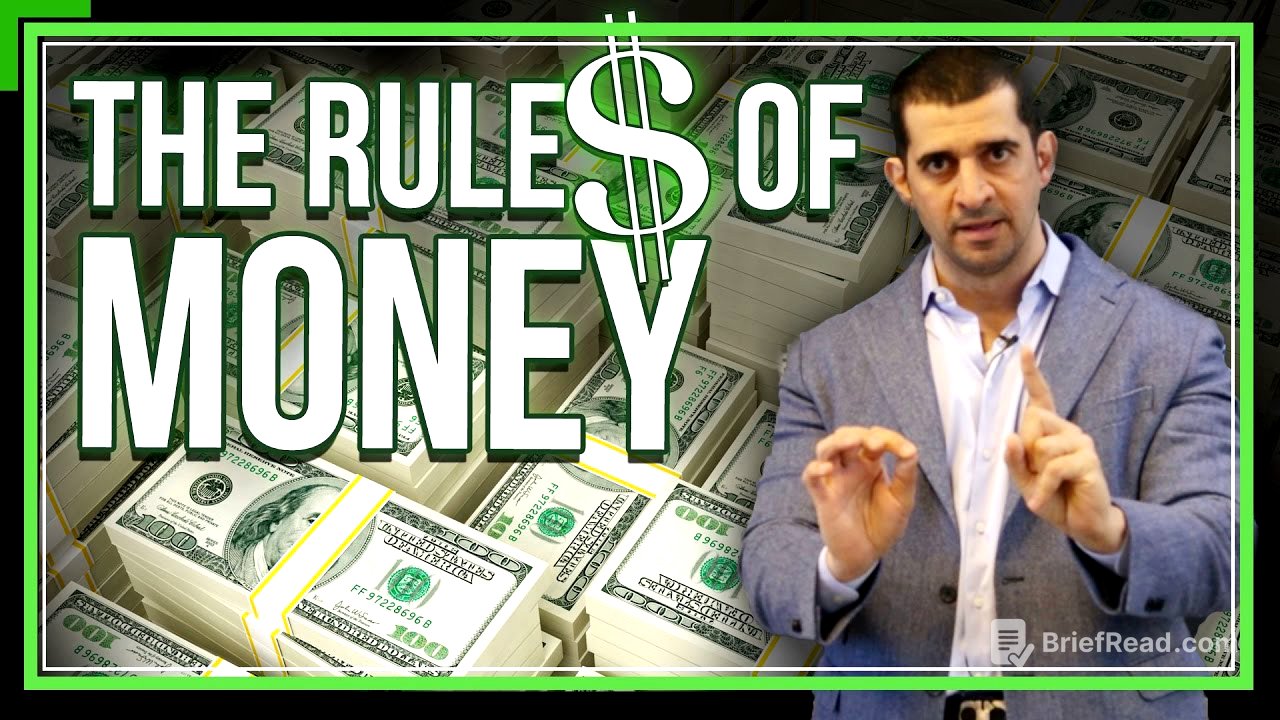TLDR;
This video outlines 20 rules for mastering the "money game", emphasising that financial success is a learnable skill. It covers mindset, strategy, and practical tips, from understanding money as a game and avoiding negativity towards it, to the importance of leverage, strategic partnerships, and avoiding the pitfalls of sudden wealth. The core message is about taking control of your financial destiny through knowledge, discipline, and strategic action.
- Money is a game that can be learned.
- Avoid negativity towards money.
- Focus on doubling your money through strategic investments.
- Develop a crisis account for financial emergencies.
- Prioritise financial goals over superficial displays of wealth.
Introduction: The Money Game [0:01]
The video starts by prompting viewers to consider the total amount of money that has passed through their hands during their lifetime. It then poses a crucial question: how much of that money remains in your possession? The speaker suggests that if you're not satisfied with the answer, it's likely because you haven't mastered the "money game". The video promises to share 20 rules of money, derived from personal experience and mistakes, to help viewers improve their financial literacy and outcomes.
Rule #1: Money is a Game [1:02]
The first and most important rule is to recognise that money is a game. Like any game, it can be learned and mastered with practice. Many people struggle with money because they don't approach it strategically, believing that wealth is solely the result of intelligence or luck. However, by learning the rules and strategies of the money game, anyone can improve their financial situation.
Rule #2: Don't Be a Hater of Money [1:52]
The second rule advises against harbouring negative attitudes towards money. If you resent or criticise money and wealthy people, you'll repel financial success. Money is attracted to those who appreciate and respect it. The speaker uses an analogy of dating to illustrate this point: just as an attractive person is turned off by someone who constantly criticises their appearance, money is not drawn to those who denigrate it.
Rule #3: It's a Doubles Game [2:44]
The third rule highlights that the game of money is about doubling your money. The speaker explains that if you have £1,000, you are only 10 doubles away from having a million pounds. The key is to focus on how quickly you can double your money, considering your risk tolerance and time horizon. Whether you have £17,000 or £100,000, understanding the doubles game helps you strategise your path to financial goals.
Rule #4: Seduction [4:37]
The fourth rule is about seducing money. Money, like a person, is attracted to those who know what they're doing and are confident in their approach. Avoid being desperate or trying to flaunt wealth. Instead, learn to seduce money by demonstrating financial intelligence and strategic thinking. When money senses that you know how to handle it, it will be drawn to you.
Rule #5: Timing [5:47]
The fifth rule emphasises the importance of timing in financial decisions. This isn't about predicting market trends or IPOs, but rather understanding when to expand or cut back in business, when to invest, and when to stay liquid. Timing is a skill learned from experience and access to information, allowing you to make informed decisions about when to act and when to hold back.
Rule #6: Boredom [6:56]
The sixth rule states that money needs to be moved and put to work. Money dislikes being idle in a checking account. If money is not actively working for you, it will go to someone else who knows how to use it effectively. Therefore, it's crucial to ensure that your money is always moving, creating more opportunities and generating further income.
Rule #7: Secret Account [7:37]
The seventh rule advises having a secret crisis account that no one else knows about. This account is separate from your emergency fund and is meant to be used during times of severe financial distress. The speaker shares a personal anecdote of how a secret account saved his business from shutting down when the company's checking account dwindled to a mere £13,000.
Rule #8: Don't Fly First Class [8:40]
The eighth rule suggests avoiding first-class flights until you have £10 million in the bank. The speaker argues that the money saved on expensive flights can be better used for investments, marketing, or hiring additional employees. He highlights that even though he can afford first class, he chooses not to pay for it himself, as the money can be used more strategically to grow his wealth.
Rule #9: Comp Plan [9:46]
The ninth rule stresses the importance of understanding your compensation plan, which primarily involves taxes. Regardless of where you live, you need to study how you are taxed, as this knowledge can help you position yourself to your advantage. The speaker points out that tax incentives often favour business owners because they create jobs, encouraging viewers to consider entrepreneurship.
Rule #10: End of the World Mentality [11:09]
The tenth rule advises against panicking during times of crisis. The media often sensationalises events, creating a sense of impending doom. However, those who remain calm and have cash set aside can capitalise on opportunities when everyone else is selling. The speaker emphasises the importance of being prepared for market downturns and viewing them as chances to buy assets at discounted prices.
Rule #11: Study Your Politicians [13:22]
The eleventh rule highlights the need to study your politicians, especially your president, and understand their philosophies. Knowing their stance on issues like taxation allows you to adjust your financial strategies accordingly. The speaker encourages viewers to be aware of the political landscape and adapt to changes in policy to maximise their financial opportunities.
Rule #12: Study Smart Investors [13:58]
The twelfth rule advises studying smart investors like Warren Buffett to understand their way of thinking. While it's important to learn from successful investors, avoid blindly following their strategies. Instead, focus on understanding their mindset and applying their principles in a way that aligns with your own goals and risk tolerance.
Rule #13: Play Your Game [14:35]
The thirteenth rule stresses the importance of playing your own game and avoiding comparisons with others. Everyone is at a different stage in their financial journey, and comparing yourself to those ahead of you can lead to reckless decisions. Focus on your own goals, risk tolerance, and time horizon, and develop a strategy that works for you.
Rule #14: Index [15:48]
The fourteenth rule suggests prioritising your own financial goals over simply trying to beat the index. While outperforming the market is a common benchmark, it's more important to focus on achieving your specific objectives. The speaker argues that business owners have more control over their income growth and should concentrate on beating their own targets rather than solely focusing on the index.
Rule #15: Befriend Money Makers [16:33]
The fifteenth rule advises surrounding yourself with people who know how to make money. Being around successful individuals can positively influence your own financial outcomes. The speaker emphasises the importance of knowing who you're doing business with and taking the time to get to know them before entering into partnerships.
Rule #16: Diversification is for Absolute Sissies [17:41]
The sixteenth rule presents a controversial view, suggesting that excessive diversification is for those with low-risk tolerance. While diversification is a common strategy, the speaker argues that it may not be the most effective way to rapidly grow wealth. He suggests that those in the "offensive mode" of their lives should consider more concentrated investments to accelerate their doubles.
Rule #17: The Game is About Leverage [19:02]
The seventeenth rule highlights that the game is about leverage. This doesn't necessarily mean going into debt, but rather finding ways to amplify your efforts and resources. Leverage can involve expanding your business, increasing sales, improving marketing, or accelerating growth. The more you understand and apply the concept of leverage, the better your chances of building wealth.
Rule #18: Positioning [19:43]
The eighteenth rule focuses on positioning yourself for success. This involves strategically placing yourself in situations where you can benefit from growth and opportunities. For example, seeking equity in a company that is likely to go public is a smart positioning move. The speaker emphasises the importance of not only earning a good income but also positioning yourself to benefit from long-term gains.
Rule #19: Strategic Partnerships [20:37]
The nineteenth rule advises creating strategic partnerships where multiple parties benefit. When others make money through their association with you, they are more likely to continue doing business with you. The speaker highlights the value of forming partnerships with companies of various sizes, creating an environment where everyone profits.
Rule #20: Big Check Syndrome [21:17]
The final rule warns against "big check syndrome," which occurs when people receive a large sum of money and start living beyond their means. The speaker cautions against treating a one-time windfall as a sustainable income, as this can lead to financial ruin. He uses the example of a real estate agent who sells a high-value home and then spends as if they earn that much every month, ultimately jeopardising their financial stability.
Conclusion and Call to Action [23:37]
In conclusion, the speaker offers a free PDF containing these 20 rules of money. Viewers are encouraged to visit PatrickBetDavid.com, find the link to the PDF, print it out, and study which rules they follow well and which need improvement. The video ends with a call to action to subscribe to Valuetainment for more entrepreneurial insights and to join the notification squad to stay updated on new content.









